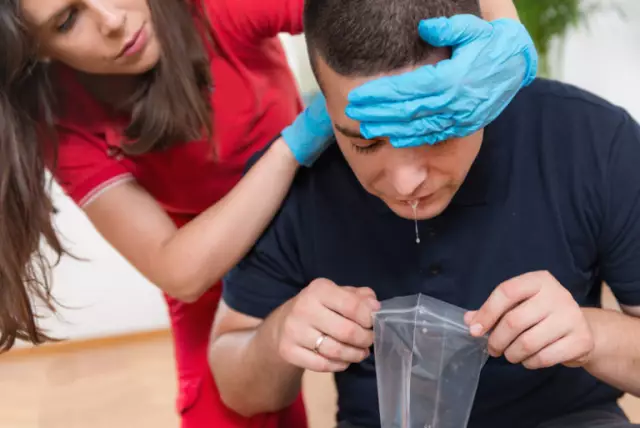- Author Rachel Wainwright wainwright@abchealthonline.com.
- Public 2023-12-15 07:39.
- Last modified 2025-11-02 20:14.
Poisoning with tansy
Tansy is a herbaceous annual plant of the Asteraceae or Asteraceae family. Has a pronounced aroma. It grows in Korea, Japan, China, Asia Minor countries, Europe and Russia. The plant can be found in meadows and steppes, on forest edges, in fields and along roads. Tansy can reach a height of one and a half meters, but most often its height is 55-60 cm. The leaves are small, oblong, rare. It blooms from mid-summer to mid-autumn. Flowers of yellow color are collected in dense round baskets.

Source: depositphotos.com
Tansy belongs to medicinal plants, decoctions from it are used to treat a variety of diseases, but it cannot be called completely harmless. An overdose of herbs during treatment can cause poisoning, which is especially dangerous for pregnant women and children.
How does tansy poisoning happen?
The tansy contains not only vitamins, glycosides, polysaccharides and other useful substances, but also a toxic component - thujone. Like cannabis terpenoids, thujone is an agonist of cannabinoid receptors, due to which it can induce hallucinations. In addition, thujone blocks the receptors of one of the neurotransmitters - gamma-aminobutyric acid, which in large doses provokes the development of seizures.
Poisoning occurs when more than 0.5 liters of tansy decoction are consumed per day or when a solution is prepared with a greater than recommended concentration of plant materials.
Children can be poisoned by accidentally drinking an infusion of tansy.
Symptoms
The first symptoms of tansy poisoning appear several hours after taking the decoction inside. These include:
- nausea;
- vomiting;
- diarrhea;
- stomach ache.
If the victim is not immediately assisted, then these symptoms of tansy poisoning are joined by:
- dizziness;
- headache;
- increased nervous irritability;
- restlessness and anxiety;
- increased physical activity;
- convulsions;
- a sharp decrease in urine output;
- swelling;
- icteric staining of mucous membranes and skin;
- lowering blood pressure;
- bradycardia.
Tansy poisoning can be not only acute, but also chronic. The latter develops when a person takes a decoction of tansy for a long time. Chronic tansy poisoning is characterized by the development of a depressive state.
Severe tansy poisoning can be fatal.

Source: depositphotos.com
First aid for tansy poisoning
When the first symptoms of acute poisoning with tansy appear, the victim needs to rinse the stomach. This allows you to quickly remove a significant amount of toxic substances from the body, reducing the severity of intoxication. To lavage the stomach, the victim must drink at least half a liter of water or a pale pink solution of potassium permanganate, then induce vomiting, irritating the root of the tongue with fingers or the handle of a cutlery. Gastric lavage should be performed at least 2-3 times, until the particles of previously eaten food are no longer detected in the vomit.
To neutralize the toxins of tansy that have managed to penetrate into the small intestine, you should take a drug with a sorbing effect. It can be Filtrum STI, Polysorb MP, Smecta or Activated carbon.
With severe diarrhea, the body quickly loses fluid and minerals. To correct the water-salt balance, the victim should drink glucose-salt solutions, for example, Regidron. This should be done often and in small portions, 1-2 sips.
When is medical attention needed?
With minor poisoning with tansy, first aid measures usually quickly lead to an improvement in the condition, and the victim does not go to the doctor. Medical assistance is needed in the following cases:
- despite all the measures taken, the patient's condition does not improve or worsens;
- poisoning has occurred in a pregnant woman or child;
- decreased amount of urine discharge or developed jaundice;
- there was a seizure and / or impaired consciousness.
Treatment of patients with severe tansy poisoning is carried out in the toxicology department. Since there is no specific antidote to thujone, symptomatic therapy is carried out to maintain the functions of all affected systems and organs. Patients are prescribed intravenous administration of saline solutions and glucose, vitamin therapy. With the development of seizures, anticonvulsant therapy is performed.
Possible consequences
In most cases, tansy poisoning passes without any long-term consequences.
In severe poisoning, patients may experience severe damage to the liver or kidney tissue, which can cause the formation of chronic failure of these organs.
Acute poisoning with tansy is especially dangerous for pregnant women and children. The child's body is characterized by physiological immaturity and high sensitivity to toxins, therefore, tansy poisoning in children is usually more severe and often leads to the development of complications. In pregnant women, poisoning with tansy can cause spontaneous miscarriage by increasing the tone of the muscle layer of the uterus.
Prevention
For the prevention of tansy poisoning, you should:
- take a decoction of tansy for medicinal purposes only as directed by a doctor;
- when preparing a decoction, never exceed the prescribed concentration of medicinal raw materials;
- do not consume more than 0.5 liters of tansy broth during the day;
- store the ready-made broth and the herb itself out of the reach of children.

Elena Minkina Doctor anesthesiologist-resuscitator About the author
Education: graduated from the Tashkent State Medical Institute, specializing in general medicine in 1991. Repeatedly passed refresher courses.
Work experience: anesthesiologist-resuscitator of the city maternity complex, resuscitator of the hemodialysis department.
The information is generalized and provided for informational purposes only. At the first sign of illness, see your doctor. Self-medication is hazardous to health!






